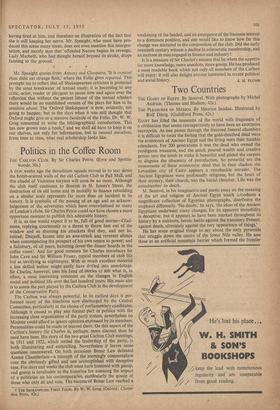Politics in the Coffee Room
A FEW weeks ago the demolition squads moved in to tear down the bomb-scarred walls of the old Carlton Club in Pall Mall, and this citadel of Victorian toryism will soon be no more. Although the club itself continues to flourish in St. James's Street, the destruction of its old home and its inability to finance rebuilding on a similar scale represents far more than an incident in its history. It is symbolic of the passing of an age and an acknow- ledgement of the adversities which have overwhelmed so many of London's clubs. Sir Charles Petrie could not have chosen a more opportune moment to publish this admirable history.
It is, as one would expect it to be, full of good stories—Glad- stone, replying courteously to a threat to throw him out of the window and so shaming his attackers that they, and not he, retired; Disraeli, frozen into an awe-struck and reverent silence when contemplating the prospect of his own return to power; and a Salisbury, of all peers, battering down• the dinner boards in the coffee room! And for good measure Sir Charles introduces Sir John Cave and Sir William Fraser, typical members of club life but as terrifying as nightmares. With so much excellent material a less skilled author might easily have drifted into anecdotage. Sir Charles, however, uses his fund of stories to salt what is, in effect, a most interesting comment on the changes in English social and political life over the last hundred years. His main aim is to assess the part played by the Carlton Club in the development of the Conservative Party.
The Carlton was always powerful. In its earliest days it per- formed many of the functions now discharged by the Central Committee, particularly in the choice of parliamentary candidates. Although it ceased to play any formal part in politics with the increasing close organisation of the party system, nevertheless no Minister could afford to ignore opinions expressed by its members. Personalities could be made or marred there. On this aspect of the Cadton's history Sir Charles is, perhaps, more discreet than he need have been. His story of the two great Carlton Club meetings, in 1911 and 1922, which settled the leadership of the party, is both illuminating and enthralling. Nevertheless it leaves some questions unanswered. On both occasions Bonar Law defeated Austen Chamberlain—a triumph of the seemingly commonplace over the obviously gifted and one 'accomplished with deceptive ease. For days and weeks the club must have hummed with gossip, and gossip is invaluable to the historian for assessing the impact of a politician on his contemporaries, particularly the gossip of those who only sit and vote. The success of Bonar Law marked a
t THE SHAKESPEARE FIRST FOLIO. By •W. W. Greg. (Oxford: Claren- don Press, 42s.)
weakening of the landed, and an emergence of the business interest to a dominant position, and one would like to know how far this change was mirrored in the composition of the club. Did the early twentieth century witness a decline in aristocratic membership, and an increase in men engaged in finance and industry?
It is a measure of Sir Charles's success that he whets the appetite for more knowledge, more anecdote, more gossip. He has produced a most readable book which not only all members of the Carlton will enjoy; it will also delight anyone interested in recent political


































 Previous page
Previous page